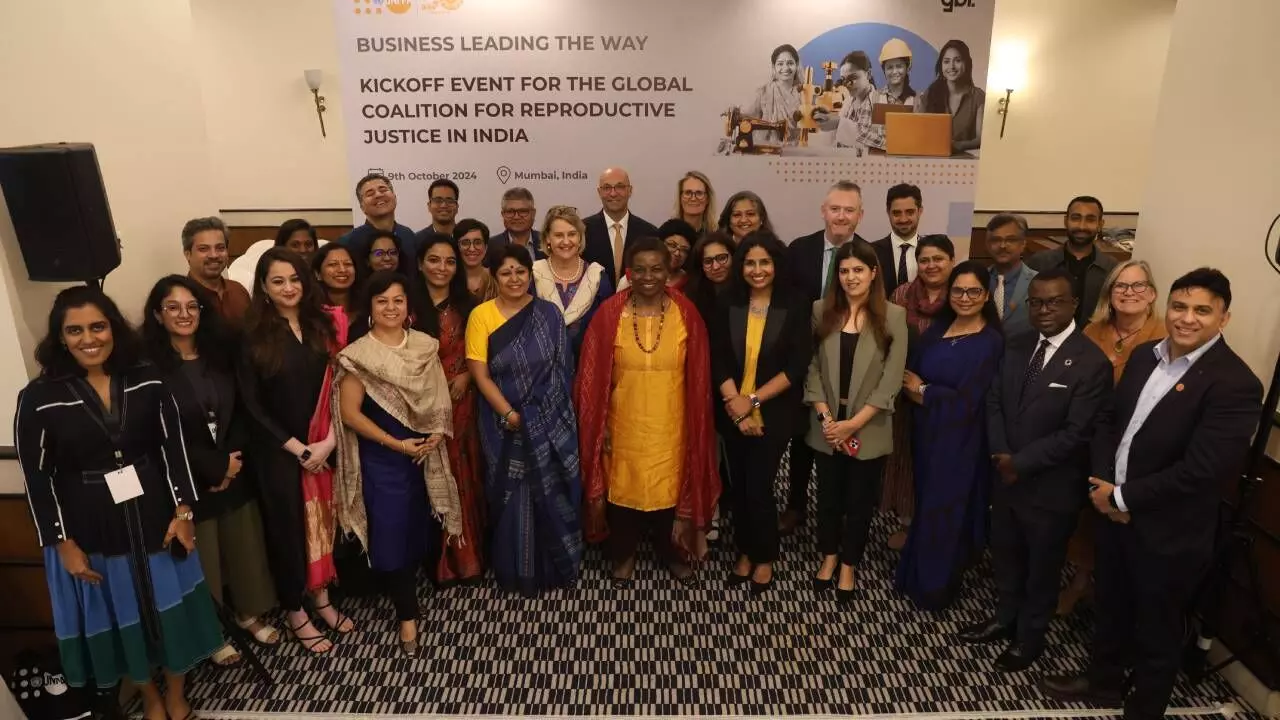Private sector commitment to advancing women’s health and rights in the workplace
The United Nations Population Fund (UNFPA) hosted a high-level private sector roundtable dialogue in Mumbai, officially launching the India chapter of the Coalition for Reproductive Justice in Business. This marks a significant step toward addressing women’s health and gender equality in the workplace
image for illustrative purpose

Mumbai, Oct 15: The United Nations Population Fund (UNFPA) hosted a high-level private sector roundtable dialogue in Mumbai, officially launching the India chapter of the Coalition for Reproductive Justice in Business. This marks a significant step toward addressing women’s health and gender equality in the workplace.
Established in 2022 and launched at the World Economic Forum in Davos in January 2023, the report is a multi-stakeholder initiative focused on accelerating corporate investments in Sexual and Reproductive Health and Rights (SRHR). It emphasizes the role of businesses in advancing women’s health, equality in the workplace, and driving economic growth.
This initiative aligns with the Government of India’s vision for gender parity and women’s empowerment. The Ministry of Women and Child Development has introduced the India-specific Gender Parity Index (GPI) to assess gender equality in the private sector, evaluating indicators such as Leadership, Pay Parity, Attrition, Maternity Disparity, and Gender-Sensitive Policies.
To further support private sector policies, UNFPA has published a measurement framework and metrics to advance reproductive health and rights in the private sector, and these metrics can help businesses track, measure and report on their success. This publication includes a set of tools and additional resources to assess current maturity in health and well-being related policies, prioritize focus areas for adoption and a return-on-investment tool (ROI-T) to measure the economic benefits of targeted health initiatives.
As India positions itself to become a $30 trillion economy, women’s economic participation remains pivotal, with a potential contribution of $14 trillion1. Yet, challenges like insufficient parental leave, workplace harassment, and inadequate reproductive health support continue to limit their full engagement. The private sector is uniquely placed to address these barriers through inclusive and empowering policies.
Dr Natalia Kanem, Executive Director of UNFPA, convened the roundtable, bringing together top business leaders. In her keynote address, she stated: “Today's discussion demonstrated how India’s dynamic private sector is advancing its commitment to women’s health and rights in diverse and innovative ways. These solutions benefit all workers and help the bottom line. This Coalition can be a powerful engine for sharing best practices and inspiring change across workplaces in India and across the world.”
The roundtable included high ranking leaders and representatives from companies such as IKEA, Godrej Industries Group, Mahindra & Mahindra, Bayer, Shahi Exports, HCL Technologies, and TATA Motors, Lupin, Welspun, Flipkart, Kongsberg Maritime, True North, Wockhardt and AVPN amongst others. Participants shared strategies for integrating SRHR into business operations, placing employee well-being, gender equality, and the overall productivity boost at the center of their business strategies. The discussions centered on the Coalition’s six key focus areas:
C-suite executives underscored the importance of localizing these focus areas to reflect India’s unique business landscape, ensuring measurable impact on SRHR and gender equity within the country’s private sector.
Andrea M Wojnar, UNFPA India Representative, highlighted the long-term benefits for businesses: "Integrating women’s health and rights into workplaces is not just a moral imperative—it’s a strategic investment in health, productivity, and employee morale. By joining the Coalition, companies access invaluable resources and best practices, contributing to a global movement for gender equality and women’s empowerment."
Pio Smith, Asia Pacific Regional Director for UNFPA emphasized “The kickoff event for the Global Coalition for Reproductive Justice in Business in India marks a pivotal moment, not just for India but for the entire Asia-Pacific region. As one of the world's fastest-growing economies, India's commitment to integrating reproductive rights into corporate strategies will serve as a compelling precedent for others.”
As the dialogue concluded, UNFPA reaffirmed its commitment to fostering lasting partnerships with the Government of India and the private sector, aiming to create more equitable, inclusive, and productive workplaces across India. The Global Coalition for Reproductive Justice in Business stands as a dynamic platform for collaboration, advocacy, and impactful change in the business community.

